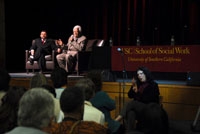Social Work Celebrates Freedom Riders
February 17, 2011 / by Maya MeinertIt was 1961 when a courageous band of activists challenged segregation laws in the South, forever transforming the Civil Rights Movement. To celebrate the 50th anniversary of the historic Freedom Rides, the USC School of Social Work invited participants to share their experiences on All School Day.
"It's a hallmark of our profession of social work that we devote this kind of time and attention to social justice and diversity," Dean Marilyn Flynn said of All School Day, which began in 1992 after racial tensions sparked the Los Angeles riots.
Each year since, the school has brought people together to raise awareness about diversity and matters of human conflict.
This year's event, "Life, Liberty and the Pursuit of Equality," held on Feb. 14 at the Ronald Tutor Campus Center, commemorated the struggles of the more than 400 Freedom Riders, black and white, who rode together on buses and trains across the South in non-violent protest of racial segregation in public transportation.
Many Freedom Riders were harassed, beaten and jailed for testing a then-recent U.S. Supreme Court ruling that outlawed racial segregation in terminals serving buses that crossed state lines.
Rev. James Lawson Jr., a Freedom Rider and architect of the Civil Rights Movement's nonviolent direct action strategy, engaged in a featured conversation about his experiences organizing the Riders, as well as social justice more broadly, with USC Dean of Religious Life Varun Soni.
Lawson, a retired Los Angeles Methodist pastor and colleague of Martin Luther King Jr., is best known for his role in leading the students who conducted the sit-ins that integrated lunch counters, libraries and voting booths in the South, as well as the Freedom Riders.
"When your enemy in social struggle strikes against you, you have to decide how to go around it," Lawson said. "Nonviolence is not just refraining from hitting back. It's insisting to use the power of love, compassion and equality to affect change. The ends and means are interrelated."
Lawson also had some pearls of wisdom specifically for social work students on what they could learn from the Freedom Rides.
"Each person can become a center of compassion and care and idealism in the world, so a critical factor is if you're going to be a social worker, treat all of the folk you're engaged with with dignity and respect," he said.
Cherry Short, assistant dean of global and community initiatives, moderated a panel with Freedom Riders Helen Singleton and clinical professor Ralph Fertig, as well as Raymond Arsenault, author of the book Freedom Riders: 1961 and the Struggle for Racial Justice.
Singleton told the audience of social work students, faculty and staff that she grew up in Philadelphia, away from the Jim Crow laws of the South. But when she and her family traveled to Virginia to visit her grandmother, that's when she encountered segregation, as they weren't allowed to eat in restaurants or use toilets once they were outside Washington, D.C.
So when more Freedom Riders were needed, it was a "no brainer" for Singleton. "I wanted to help to bring some change," she said.
Fertig joined the Freedom Riders on June 1, 1961, when he boarded a bus bound for Montgomery, Ala., with four other Freedom Riders.
Known for his background in social justice, Fertig was handpicked by members of the movement, including Martin Luther King Jr. Fertig hesitated at first – he didn't want to be viewed as a "meddling outsider from up North," as he was living in Chicago at the time – but King convinced him by explaining that racial equality wasn't a matter limited to the South.
"None of us is free anywhere until all are free everywhere," King told him.
Fertig's experience testing the enforcement of separate-but-equal practices in bus stations was harrowing: Not only was he verbally assaulted, he also was thrown in jail and physically beaten to near death by white inmates.
"Like in Cairo, [the Freedom Rides] came from the people, the grass roots," Fertig said, referring to the recent government overthrow in Egypt. "It came from a love that transformed America. That's why I had to join the Freedom Riders."
Fertig also related the experience of the Freedom Riders to the work of social workers.
"Cultural and social competency comes from respecting people's need to be themselves," he said. "We're enablers in that we take people beyond where they are. That's why social workers are the natural heirs to the Freedom Rides. You conduct a Freedom Ride every time you meet a client."
Arsenault described his reasons for devoting a decade to writing his book. His work as an assistant to a civil rights history professor at Princeton University helped inspire him to learn more. When he discovered that no scholarly paper had been written about the Freedom Rides, he took it upon himself.
"It took me 10 years to write the book," he said. "My daughters say to me, 'When are you going to get off the bus?' I say, 'Never!'"
To reference the work of our faculty online, we ask that you directly quote their work where possible and attribute it to "FACULTY NAME, a professor in the USC Suzanne Dworak-Peck School of Social Work” (LINK: https://dworakpeck.usc.edu)
